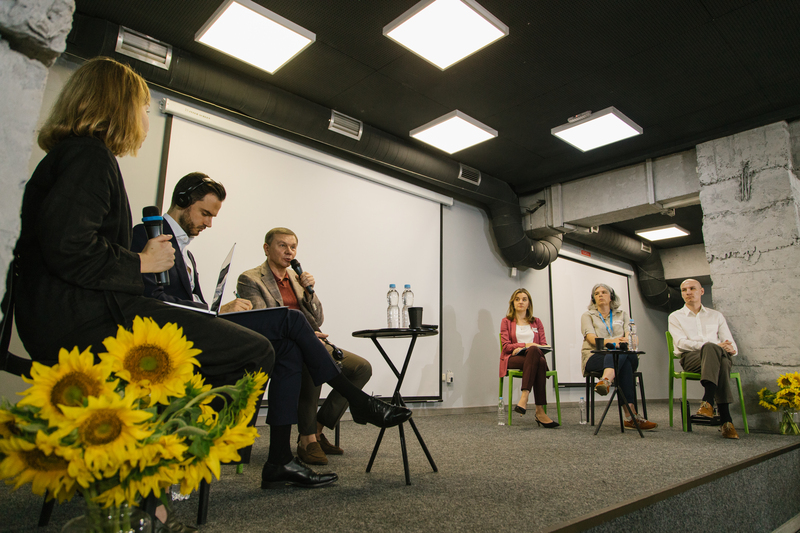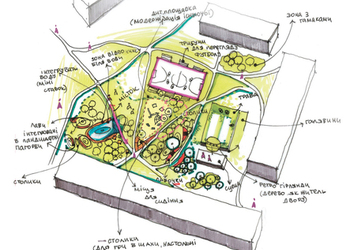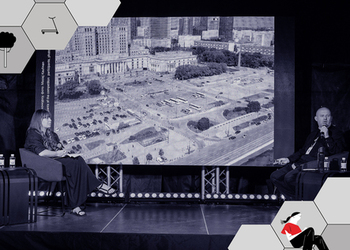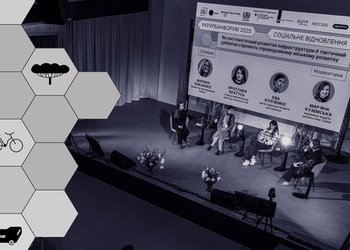The main topic of this year's Ukrainian Urban Forum was the reconstruction of housing in the context of war and the development of a fair housing policy. What is the role of communities and how to involve city residents in the processes of urban recovery? What are the challenges of the cities that have hosted large numbers of internally displaced people? What principles the cooperation of local authorities with international partners should be based on?
The organizers invited this year's forum partners to the Opening Ceremony to discuss key issues arising on the path to the recovery of Ukrainian cities. The discussion was moderated by Anastasia Bobrova, Senior Analyst at Cedos and Coordinator of the Ukrainian Urban Forum.
Serhii Morhunov, Mayor of Vinnytsia
The meetings, for example, of city mayors, often reveal a tendency to understand recovery as rebuilding things that existed before. Considering the condition of the infrastructure today, either critical infrastructure or housing, we have a chance to adopt a new approach for recovery after our victory. This requires, first of all, a thorough expert examination. We will not be able to properly identify all priority areas for recovery without our partner’s expert opinion.
Today, any driving force behind the capacity of a territorial community is its economic potential. This is, in fact, creating jobs and investments. In Vinnytsia, we are gradually moving in this direction. However, if you look at the employment statistics among IDPs, you will see that out of 47 thousand people, even though 12 thousand among them are children and another 12-15 thousand are older persons, many of the remaining part do not want to work at enterprises, largely because of uncompetitive working conditions. There are some people involved in the public sector, such as doctors and teachers, but it is only about 2 thousand persons. Moreover, we need to create conditions to return for those Ukrainians who have left abroad. And it is not just about jobs, but also about the comfort and quality of life in cities. Where will people rest? How will they enrich themselves culturally? Where will they go for sports, what kind of public transport will they use? And most importantly, what kind of good quality utility services will they receive?
I am convinced that no territorial community, including Kyiv, cities with a population of over one million, is able to solve all these problematic issues independently in terms of creating such ecosystems. Due to the lack of funds. However, there are no international banks today that would be ready to work directly with local self-government bodies. It requires state government guarantees. And if the state government collects such requests from communities and prioritizes them, then it is clear that cities such as Vinnytsia, Khmelnytskyi and others will be supported on a residual basis. We should consider how to establish decentralised cooperation through partner cities in Europe, through relevant financial institutions and funds. When the work takes place directly with the community, institutions will be able to verify the positive practices in the implementation of certain project investment solutions that have been worked out directly with the communities.
Jorg Zinken, Deputy Head of the Economic Department and Coordinator Reconstruction of the Embassy of the Kingdom of the Netherlands in Ukraine.
When referring to recovery, we are trying to do everything we can to support Ukraine, ranging from humanitarian aid, covering people's first needs and the early stages of recovery. Important elements of this policy are water supply, health care and agriculture. Other issues include the construction of infrastructure, the building of living spaces and social housing. The analytical report of the World Bank stated that this area is critical, and we are directing our work there as well.
Part of the program is also the financing of ideas not only from large sources. We are trying to find small companies that work in the Netherlands and can help Ukraine in recovery process. When referring to housing, we held some educational workshops in the Netherlands together with an agency responsible for environmental impact assessment. There is a city in the Netherlands, Utrecht, which deals with this issue. It provides assistance to Ukrainian local authorities, shares experience, shares knowledge that we have gained at home. Experts come here for a few months and help implementing changes in Ukraine. Such a positive experience can be expanded.
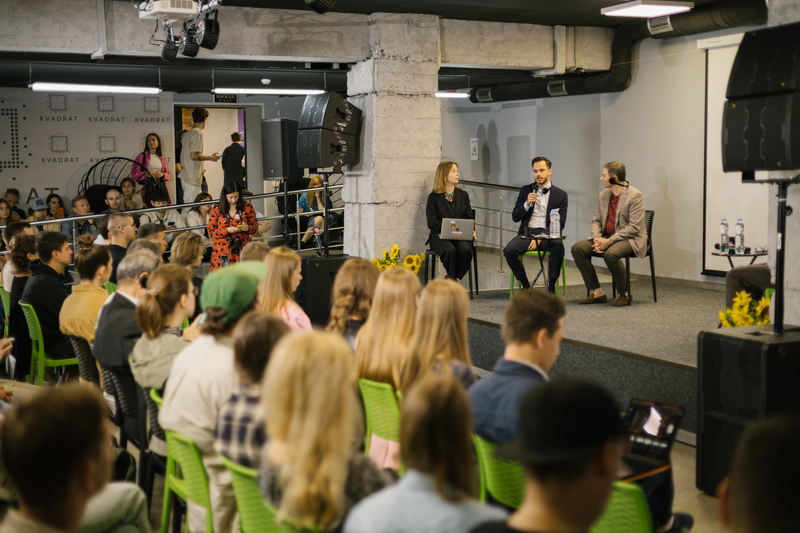
Sofia Oliynyk, Coordinator of the Programme "Democracy Support and Human Security" in 2020-2023, Heinrich Boell Foundation, bureau Kyiv, Ukraine.
A person should be in the centre of recovery. Of course, the destroyed infrastructure must be restored, but we should always remember that at the center of this process are the people who live in these cities. How can cities respond to the challenges of war that have arisen over the past 9 years? How can they be adapted? The recovery should take place concurrently with the reforms started earlier and that are already ongoing. One of the key reforms, which I consider one of the most successful, is the decentralization reform. The fact that the powers were transferred to the places helped the cities to confront in the context of a full-scale war. Actually, now it is important to multiply these powers and opportunities provided by the decentralization reform in the conditions of recovery and reconstruction.
We often talk at foreign meetings that we have a unique opportunity to start everything from scratch, as it is better to build everything from scratch. Now more than ever we can consider sustainable development, how our cities can become more inclusive, accessible, how sustainable mobility can be implemented. And we also, perhaps, should think not only about roads, but also about bike paths, whether we have pedestrians, how the city is planned, or whether it is more environmentally friendly, or whether the needs of different inhabitants are taken into account in the recovery process.
As the Heinrich Boell Foundation in Ukraine, we work in several key areas. This is support for democracy, in particular, for local participatory politics. We encourage and support various partners in Ukrainian cities to provide expertise to local governments and mobilize local activists. Moreover, we work on the topics of climate and energy policies, gender equality and human security. These four components are key for us in the recovery process.
It is important to start trusting each other's expertise. In urban development, mobility, human rights, in the environmental field, both in some entities and in society. We have many experts in the academic and public sectors, and we shouldn't be afraid to cooperate. Addressing to academia or civil society, it is important for us to go beyond our bubble and collaborate with the cities where we are located. Our expertise is more valuable than ever and it can be implemented not on paper, but in practice. It is about mutual openness and willingness to cooperate.
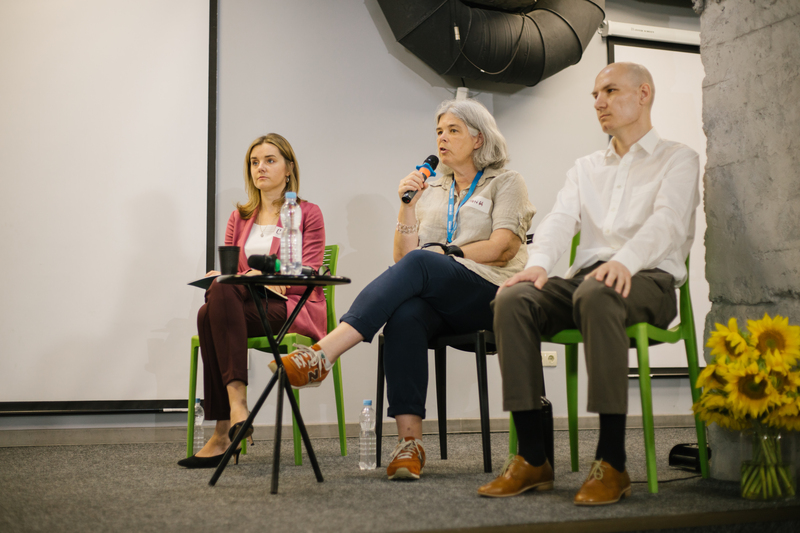
Fiona Allen – Senior Development Officer, United Nations High Commissioner for Refugees (UNHCR).
“Our work, as an international agency, based on three key concepts – partnership, coordination and localization. We should create partnerships for supporting Ukraine in its time of crisis and recovery, and all of these value-added components are not only key, but also important at the local level, to help those communities that have been most affected by war. As for coordination, there should be a platform for the exchange of different experiences from all over Ukraine. At the same time, the main driver for changers and decision-makers should be Ukrainian communities.”
Pavlo Fedoriv, Advisor in Integrated Urban Development in Ukraine II Project.
"Integrated Urban Development" Project”, commissioned by the German federal government and the Swiss Secretariat for Economic Affairs, works to improve the living conditions of people in partner communities. Such partners are Lviv, Chernivtsi, Zhytomyr, Poltava, Melitopol, Kharkiv, Podilsky rayon (district) of Kyiv and Vinnytsia. We function both at the national level, for example by working with the legislative and regulatory framework, and at the local level, helping to implement structures and procedures that will move cities closer to better, inclusive, equitable planning.
The reform of decentralization in local governance has generally given cities both great powers and resources. However, today the integrated development still faces a lack of municipal capacity in some cases and national regulation.
The sphere of housing in Ukraine was depoliticized for a long time. Therefore, the return of housing issue to the political sphere, to the understanding that housing is still a subject of housing policy regulation, both at the national level and at the municipal level, will be key in the future recovery of Ukrainian communities.
The return of the housing economy and policy to the spheres of architecture and spatial planning is a key challenge for Ukraine today. Our project is working on deepening expertise in this area. We have already supported the research developments for Vinnytsia and will continue to support Vinnytsia and other cities in developing an evidence base and piloting projects in the field of housing, both for IDPs and for new members of a community who will return home.
Of course, it is Ukraine that bears the responsibility for the future coordination of assistance that can be provided by governments of other countries, international technical assistance projects, humanitarian organizations and international financial institutions. This is all the responsibility, in my opinion, first of all of the central government. And all the rest, i.e. how exactly the recovery will be localized in cities, should take place in accordance with the European Charter of Local Self-Government and in accordance with the principle of subsidiarity.
Surely, as a project, we are working to ensure the participation of the population in the decision-making process as a structural element in the functioning of modern municipalities. Moreover, there are two important theses. The first one is multi-level governance and the second one is inter-municipal cooperation. The first thesis means that we should inevitably create models of how different levels of government will work with each other – local self-government, central government and some entities. All this is ahead but we should think already today who will be responsible, for what and to what extent. The second thesis is about inter-municipal cooperation. As a project, we support such events as an intermunicipal training network based on the Association of Ukrainian Cities. In various working groups, cities are working to share experiences and knowledge, develop solutions that they can transfer to central government and solve problems they face in everyday life.
